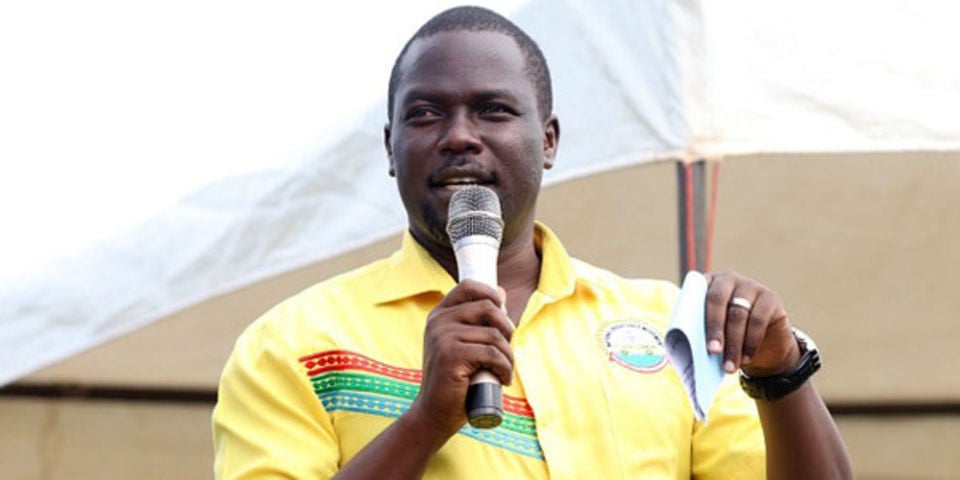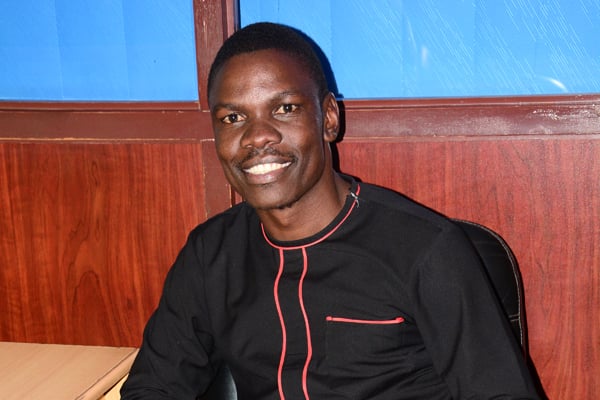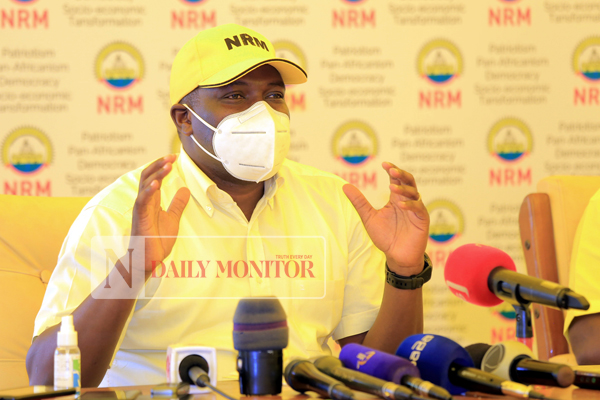Prime
I don’t see any need of discussing Museveni’s succession – Todwong

The ruling National Resistance party Secretary General, Mr Richard Todwong. PHOTO | FILE
What you need to know:
- In a wide-ranging interview with Sunday Monitor, National Resistance Movement secretary general Richard Todwong says they have learnt from their past mistakes and are already preparing for the next election, writes Derrick Wandera.
It has been close to eight months since you were appointed NRM secretary general. How has it been so far?First, it’s an honour for me to have been nominated by the President to become the secretary general of the NRM party. At this point in time it comes with huge responsibility and a lot of challenges. Knowing the history of the party; membership of the party; period the party has been in office; and achievements of the party all come with a lot of expectations and challenges. It has been the busiest period in my life.
What have you achieved in the first eight months?
We have been able to make our team understand the task which is in front and we have a wonderful team that understands the assignment. Two, we have been able to find our service; a convergence point of view that regardless of our background, social difference, we need to unite as a team and work together.
Through my position as chairperson of Ipod (Inter-Party Organisation for Dialogue) with other political parties we have been able to lobby government to increase funding of political parties which has been ably done. All political parties have received some money.
I have been able to go across the country to unite our members. We have established clinics with the youth to help them understand the history of the party and appreciate that function done by their leaders.
Another thing that we have been able to do is analyse the government pay system. We have advised government on how it can pay and improve the civil service pay system. We have shared the proposal with government and believe through the President our proposal on salary will be implemented.
There are allegations against government of torture and unlawful incarceration of some leaders. What are you doing to correct some of these problems?
It’s not an official position of government to torture and intimidate the citizens. You are also aware that the President warned officials not to disturb, slap, beat and torture [people]. So these are acts of individuals, not government. For example, when members of NUP were beating a woman at Kisekka [market in Kampala] for putting on yellow during the riots, it was an act of individuals, not NUP as a party.
There is talk that President Museveni at 76 years is aging and could be becoming weaker. Are there succession plans as a party?
The party is very organised; we don’t discuss speculation. The President is still around and young and he is not going anywhere very soon.
So you’re not discussing succession?
Succession as a topic is narrow. Succession is a wide topic, there could be succession in local government. Managing succession is like driving a manual car. You need a lot of activities done at both local government and Parliament. How much of the Budget is being implemented by the local government? I don’t see any need of trying to discuss succession.
Looking at the healthcare system of our country, what is your assessment?
We are trained to look at things philosophically. The philosophy of NRM in terms of health is that we look at it in terms of prevention, cure, or management. For instance, when a mother conceives, it’s in the interest of the party. We care about the pregnancy from the time of detection, we start preaching antenatal care and sleeping under a treated mosquito net.
We talk of hygiene, behavioural change, disease prevention and vaccination. So if implemented, we can reduce hospital visits by 70 percent.
Every district has a referral hospital and in the sub-region, we have a sub-regional hospital. Medicine is available. Now Mulago [National Referral Hospital] is carrying out heart surgery and organ transparent, though nobody talks about it.
You seem to suggest that we have it all in our healthcare system. But recently government had to get large sums of money to fly Speaker of Parliament Jacob Oulanyah to the US for better treatment…
You have mentioned a complicated matter. Human medicine is something complex. It’s not true that our healthcare system cannot manage such diseases and they should not have been taken for further medication, but the nature of the office they hold also qualifies them for the second option.
For example, the Speaker of Parliament has been here and has been managed by Mulago, which is one of the best hospitals in the region. If you look at the medicine from India, UK and USA, it is different from what we get here in our hospitals. For one to leave the country, he must have been approved and cleared by the medical board. But 80 percent of the conditions are managed within the country.
The national elections could be done, but the election cycle continues with elections at the local councils. How are you doing as NRM?
At the moment we are planning to clean the register because our primary was very rough. Two, we need to carry out civic education so that we don’t have to experience what we faced in the concluded elections such as court cases and ballot staffing.
What caused the messy primaries?
A party is like a human being; it grows every day. Every day new people join the party and their numbers are activated. Also, we mended our party constitution so that people line up during the primaries. The register was not clean and we ended up with a lot of challenges during the primaries. We agreed to register for the next [election].
The party has been in power for more than 36 years. We expect the level of organisation to be top notch
We have challenges of resources because most of the funds we get from Ipod. We also have a challenge of polling stations; we have more than 70,000 villages. We have a timetable to be released by the electoral commission, so all these need us to prepare early. But, like said, we have started early enough so that we can overcome these challenges. And you are right, we need to be the most organised party.
Government has at times accused National Unity Platform (NUP) members of interfering with NRM primaries. How was that possible?
It’s true. In the middle of primary elections our voter register was challenged by members. Our chairman said voting was through lining and many interfered, and indeed many of them were members not from only NUP, but also FDC (Forum for Democratic Change), UPC (Uganda Peoples Congress), DP (Democratic Party), among other parties.
You went through an election that ended being contested. Government was not only accused of violence – during the November 18/19 2020 protests – but also election malpractice. What caused all these?
It is one of the things political parties that belong to Ipod are trying to clean. That you as the leader need to discipline members within your party. For example, if the Electoral Commission comes out with a roadmap, we need to follow. Because there are people who don’t subscribe to any political party, but pay taxes and work in markets. These are public goods that leaders should protect.
So if the Electoral Commission comes up with a roadmap that we should not disturb peace of the market, that’s exactly where NUP went and when government enforced the law, they blame government, and when enforcement comes there is a clash.
But at the start of the campaigns, we saw NRM leaders breach the rules. We saw Minister of Health Ruth Aceng and Haruna Kasolo, the current minister of Microfinance, break the guidelines. Did you ever call them to order?
It was not NRM that started it. NUP started defying the Covid-19 regulation where they would hold a public gathering of more than 200 people. NUP stated having mass rallies in markets and roads. We also had to do the same. It was a provocation from NUP.
I wonder why the NRM chairman was never provoked by NUP. He never held any processions like Aceng and Kasolo
The “why” question can be answered by the minister. We set a committee to investigate [her] and she was summoned to the disciplinary committee.
Our chairman understands that he cares about the lives of Uganda.





